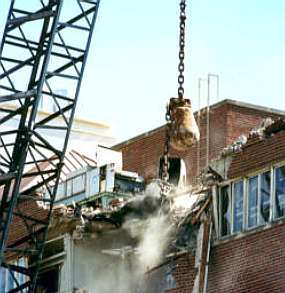Ben Witherington discusses what he sees as the Christian response to bitterness over at his eponymous blog. He notes the distressing tone of cynicism and bitterness in the lives of young people today, feelings Ben did not witness in his own generation, even though both generations have endured similar reasons for becoming bitter.
Ben says the key to resolving this bitterness is to forgive the individuals who have wronged us.
Unfortunately, he’s missing the real reason why this younger generation is bitter.
If I were bitter because my neighbor shot my dog, poisoned my well, and plundered my fields, I would be angry at a flesh-and-blood person. I can see him. I can have a relationship with him. I can forgive him.
But if I were bitter because the government shot my dog, poisoned my well, and plundered my fields, there’s no individual flesh-and-blood cause for my anger. I can’t see the government system. I can’t have a relationship with a system. How do I forgive a nebulous entity that is neither him nor her—and may even include me?
The forgiveness fix Witherington advocates works fine for dealing with interrelational bitterness. But the bitterness he sees in today’s young people doesn’t have its roots in a teacher that unjustly slapped wrists or a love interest who done wrong. The bitterness in today’s youth comes from being mugged by systems and seeing no way to respond.
Consider a well-known system currently on display in the theaters. Slavery epitomizes a system that grinds up people and mangles everything it leaves in its wake. We get a good feel for this in the movie Amazing Grace. Did the Africans subjected to that monstrous system become bitter? Who could they forgive? It wasn’t individuals that enslaved them, but a system.
While forgiveness is always called for when dealing with any wrong, even those perpetuated by a system (in as much as it is possible, especially toward the most guilty individuals within the system), the proper Christian response is to bring the Kingdom of God against the system, against the kingdom of darkness (or even murky grayness) it represents. Too many of us fail to see that systems that break people’s spirits get their power from demonic sources, and we Christians must wrestle against them.
This is exactly what William Wilburforce did. He brought the entirety of his faith in Christ against that unholy kingdom/system of slavery and vanquished it. He understood that systems must be assaulted in ways that individuals can’t be.
As Christians, we forgive individuals, but we pull down ungodly systems.
Our society today runs entirely on systems in a way that it did not just forty years ago. Even our churches have become systemized. Some paleoconservatives have deemed this shift “The Managerial Society,” and it’s a form of socialism like the kind we Americans used to routinely mock in the old Soviet Union. Nearly every encounter we have in daily life within the US today has a system lurking behind it. Those systems explain why we have no great men in government now, only systems. Great men and women stand up against political injustice, but systems toe the system line, even if it’s bad for the whole the system operates within.
Young people today are bitter and cynical because they’ve grown up within these systems and they can’t see any way to transcend them.
Sadly, the one group designed to beat the system, the Church, can’t seem to get off its duff and do what Christ charged it with: tear down strongholds.  The glaring error I see within the Church, even in those churches that understand strongholds, is the failure to acknowledge that they go far beyond individuals. We may talk about strongholds in a person’s life, but do we ever talk about strongholds in the entire culture? Not very often!
The glaring error I see within the Church, even in those churches that understand strongholds, is the failure to acknowledge that they go far beyond individuals. We may talk about strongholds in a person’s life, but do we ever talk about strongholds in the entire culture? Not very often!
How does the Church go about performing this duty?
Ford will close the transmission plant near where I live. Thousands of longtime autoworkers will see their only hope for work in this region go up in smoke. I suspect a lot of folks will be bitter. They’ve put in years, and now what? What does a 52-year old autoworker do when he’s one of two thousand let go in a town of about ten thousand? Who does he forgive for his bitterness? Is there a face he can envision when he attempts to bestow forgiveness?
Too many Christians would ask him to do just that. But that’s not the Christian response. The Christian response looks deeper and broader. On a macro level, it asks questions about the way our economic system works and what it does to create these bitter people. Then it finds solutions to ending the cycle that churns up workers and later buries them. On a micro level, it stands beside the autoworker in its midst and makes it our singleminded obsession to help him find good work, keep his home, and take care of his most basic needs, be they material, physical, or spiritual.
That’s bringing the Kingdom into a system, opposing the cycle that breeds bitter people. And we’re simply not doing that. We’re asking people not to be bitter, but we stand on the sidelines and let the system grind ’em to pieces.
When the Roman system tossed aside the sick, Christians fought the system and took care of them. Later, the Roman system fell, in large part, because the Kingdom of God toppled it. Throughout history, Christians have been at the root of bringing down unholy systems and kingdoms–and not just because they forgave, but because they understood that the light shines in the darkness and the darkness cannot overcome it.
It is easy to tell bitter people to forgive. It is far harder to roll up our sleeves (all the while remembering our Kingdom cannot be vanquished) and fight systems that breed bitter, broken people. That first answer consists of words, the second of blood, sweat, and the strong right arm of our triumphant God.
 Because nothing beats a spectacle when attempting to prove one’s royal lineage.
Because nothing beats a spectacle when attempting to prove one’s royal lineage.
 The glaring error I see within the Church, even in those churches that understand strongholds, is the failure to acknowledge that they go far beyond individuals. We may talk about strongholds in a person’s life, but do we ever talk about strongholds in the entire culture? Not very often!
The glaring error I see within the Church, even in those churches that understand strongholds, is the failure to acknowledge that they go far beyond individuals. We may talk about strongholds in a person’s life, but do we ever talk about strongholds in the entire culture? Not very often!